INSIGHTS FROM THE AFIRE 2019 RISING LEADERS SUMMIT
“Power does not corrupt. Fear corrupts… perhaps the fear of a loss of power.”
John Steinbeck
Fear is a real enemy for leaders. It drives them to flee from risk, rather than work through it, and instead default to outmoded habits that seem safe only because they’re familiar – but not because they’re smart. Fear prevents thoughtfulness and careful assessment. It forces self-centered, defensive thinking and ultimately pushes leaders into fight-or-flight mode.
By deferring decision making and surrendering to the status quo, or by making decisions based on pure emotions, leaders will struggle to achieve optimal outcomes. In other words – fear stymies good leadership.
With these concepts in mind, rising leaders from across AFIRE gathered in April to face fear head-on and discuss the commercial real estate landscape as it exists today, including how it’s changing, and how best to grow as leaders through this change. This report touches on a few of the important meeting highlights.
—
WHAT WILL CREATE A COMPETITIVE EDGE FOR THE FUTURE?
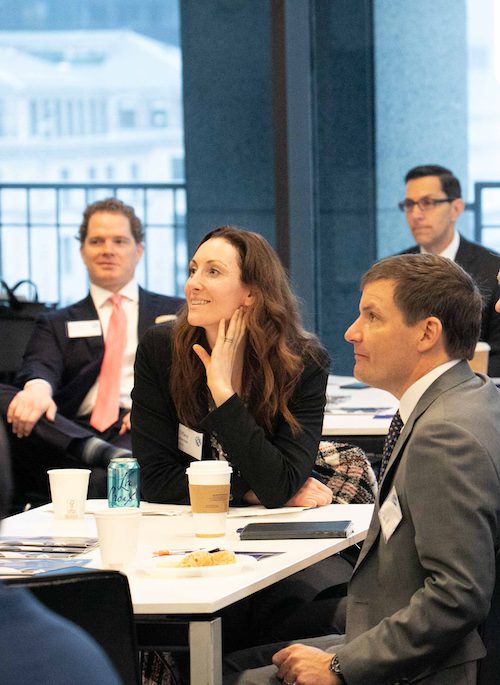
Tiffany Gherlone, Head of Real Estate Research and Strategy at UBS, opened the Rising Leaders discussion with a critical look at the status quo. “If our environment continues to be driven by property-level income, asset manager performance, and managerial value-add, then the question is: What does the ideal firm of the future look like?” Gherlone said, asking how the future will be different if our underlying fundamental assumptions remain the same.
Broadly, Gherlone said, there will be less reliance on gut instinct. Data-based decision-making is increasingly forming the basis of managerial processes, which will be an advantage for real estate leaders – including determining who is in the room. For example, Gherlone added, “Many of us were probably hired by algorithm.”
Whether it’s the keyword search through an employment résumé, or a detailed employment test, data-based decisions are standardized across the managerial pipeline. But data in the real estate industry is, of course, not limited to talent acquisition. It’s ultimately about how investment leaders analyze, manage, and dispose of their investments.
“Benchmarking is becoming a lot easier and a lot more effective,” Gherlone said. “We collect data on all of our properties, but it’s a quarterly process at present.” Soon, she added, data will be collected instantaneously, and as data collection becomes more automated over time, “we will be able to open up our computers or phones or whatever device is prevalent and see what is going on with our buildings in real time.” Smarter systems will be able to identify maintenance issues such as water leaks, electrical problems, or even tenant risk long before the human managers. “Computers will call meetings. It’s robot assistance to be sure, but we should not fear that assistance,” Gherlone said, adding that leaders in the industry should instead be wary of the lack of information with which they presently manage their investments.
“Today, many deals are done to maintain a relationship or because one of the ranking officers has a good feeling about it,” Gherlone said. As a result, supporting data analysis is often crafted to prove a deal theory – not the other way around. This is classic confirmation bias. “Going forward, data will lead the analysis and gut will not.”
HOW CAN DATA CHANGE HOW WE OPERATE?
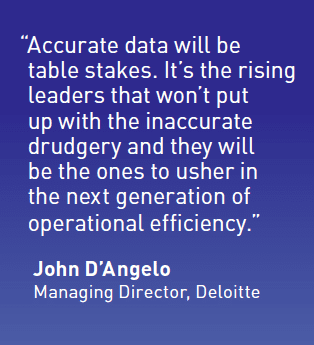
“Managing deals is like coaching kids at a soccer game,” said John D’Angelo, Managing Director at Deloitte. “Everyone crowds around the ball and then there are two goalies at either end. The goalies are the operations people and everyone else forgets their position.”
Playing the position you are assigned is crucial to efficient operations, D’Angelo said, “but much of the work that people are tasked with is manual and boring.” This is why, when something exciting comes along, such as a potential deal, everyone drops what they are doing and joins in the fun, D’Angelo said. “My hope is that much of that menial labor will be taken care of by computer programs in the not too distant future.”
Increasingly companies are hiring what D’Angelo calls, “digital natives” – those young professionals for whom the internet has always existed. “These people are our future and they are data junkies. They can find almost anything known to humankind on their phones and it’s not novel to them.” In day-to-day life, they’re masters of data manipulation, but those who find jobs with a commercial real estate investment manager often find themselves manually entering data into a spreadsheet – which remains the system of record for most companies well into the 21st Century. It’s frustrating for digital natives to not have a technology-enabled way to expedite this task. “This has got to end,” D’Angelo said.
Every manual keystroke does two detrimental things: It annoys the employee and it allows for human error. The more annoyed the employee, the less attention they will pay to the veracity of their work. “We spend so much of our time thinking about whether the data we are using to inform our decisions is accurate,” D’Angelo said. “What if all that time was spent thinking about what these data mean?” To start: More efficiency and accuracy. “This is where we are going,” D’Angelo added. “Accurate data will be table stakes. It’s the rising leaders that won’t put up with the inaccurate drudgery and they will be the ones to usher in the next generation of operational efficiency.”
While data governance and discipline is “spectacularly un-sexy work,” D’Angelo said, it nonetheless requires leaders to help change “the institutional mindset of ‘data is my asset,’ to ‘data is our asset.’”
WHY AND HOW SHOULD ALTERNATIVE ASSET CLASSES BE CONSIDERED?
“We knew that there were a lot of companies out there that were better at the four major food groups than we were going to be,” said Geoff Regnery, Senior Managing Director at Harrison Street, referring to the company’s launch in 2005. “We knew that there were underrepresented segments that could give us an edge.”

The challenge for investing in different segments, as Regnery saw them, was quickly apparent. “It was very difficult to get any data or reports from JLL or CBRE on educational housing, senior living, self-storage, and medical office.” Harrison Street decided that they would need to gather the data themselves. “The problem was the micro-markets that many of these asset classes depend on. Self-storage is usually a two-mile trade area. Senior living is more like five or six miles.” The team at Harrison Street knew they could not possibly gain enough ground-level knowledge to be competitive on an institutional level, so they started to seek third-party operators and collaborators.
“Not only did we need to create this new operational model, we had to convince investors to buy the strategy; or rather, convince them that we could sell the assets to a market that didn’t exist. We had a liquidity problem,” Regnery said. Investors understood the fundamentals of alternate classes, but they did not believe there was any way to accurately value the assets or dispose of them into a competitive group of buyers. “There were only two student housing REITs, a couple of storage REITs, and a few healthcare REITs, but the institutional market was much less developed.”
Harrison Street consequently developed a systematic approach for alternative asset decisions. “We looked for assets with a high-income premium to traditional investments in fragmented sectors that had high barriers to entry,” Regnery said. It was a successful strategy but it wasn’t foolproof, as Regnery illustrated through a closer look Harrison Street’s investments in marinas, which fit the firm’s parameters for alternative asset decisions.
It’s difficult to build a new marina, and most boat owners tend to trade their boats along with their slips, which results in the same boats sitting in the same slips, but many different owners along the way. The fundamentals looked very promising, Regnery said, but there was a problem: “The debt capital markets did not want to capitalize the transactions, [and] there were maybe two lenders. From a liquidity standpoint, we thought there was more demand than there was.” Additionally, there are operational issues totally unique to marinas, including “fights over water rights and lake-level issues that are completely out of our control and out of the norm.” Despite the data, these investments were a case of “good on paper but not in practice.”
Sometimes, there is something unexpected that a system or algorithm isn’t programmed to detect. But more intelligent algorithms have the ability to learn and become more effective over time. Every mistake can become a lesson learned.
HOW IS REAL ESTATE CHANGING?

“Our industry is very change-resistant and we will get consumed by external changes if we don’t get out of this continuous echo chamber,” said Bryan Sanchez, CIO of Lionstone Investments, adding that Lionstone has perceived a shift in the investment landscape and understands that doing things the “old-fashioned way” won’t work in the future.
To illustrate, Sanchez discussed how Lionstone consulted a group industry leaders to advise on how the firm could plan for its future. Many recommended tackling emergent problems with old-fashioned tools.
“We needed to look for outside opinions but found that most larger consulting companies didn’t have a real estate-centric department and, as a result, couldn’t really help us,” Sanchez said. Soon he approached McKinsey & Company, the global management consultancy, which had a newly formed practice focused on real estate transformation.
By the end of Lionstone’s work with McKinsey, Sanchez said the group came away with a clear message: “Algorithms and advanced analytics are the way of the future – and we need to triple down on that.”
“Globally, the amount of money invested in real estate is about the same as private equity – about $3.6 trillion,” said Brian Vickery, Associate Partner at McKinsey. “Private equity gets the lion’s share of most allocations presently, but real estate is on the rise.” For example, CRE comprised an average 4.5% of a standard portfolio allocation for most LPs in 2005. By 2009, the average increased to 9%. As of today, most LPs have stated that they are underweight on real estate by about 1%. “That means there is roughly $350 billion of capital waiting to be allocated,” Vickery said. “Historically real estate has outpaced the market and the future looks to be more of the same.”
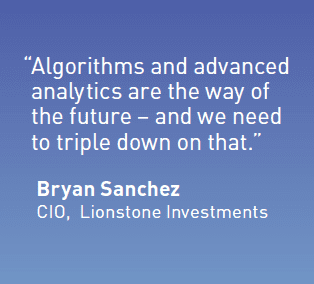
“The rise of indexing is really important,” said Ju-Hon Kwek, Partner at McKinsey. “There is a complete reassessment going on in LPs around how to generate alpha. Wherever alpha is hard to generate, you are seeing more passive investments and ETFs.” Which is good news for real estate, because many see it as an active investment where day-to-day decisions cannot be automated.
LPs are also looking for lower-risk investments, which have traditionally been one of the benefits of investing in real estate. But LPs are also seeking higher liquidity and lower costs. As a result, hedge funds are getting hit hard because of their fee structure. Real estate is also a fee-driven business, so there will continue to be significant compression. “We have to diversify our capital sources,” Kwek said. “Pension plans write big checks but will not pay big fees. Family offices and high-net-worth individuals write smaller checks but have no problem paying the fees.”
“Real estate used to operate as an equity replacement. People were looking for high-octane returns,” Kwek said. “Now it’s doing a fundamentally different job. It’s long-dated assets, highly generative cash flow, and yield. It has become a fixed income replacement in a time where fixed income no longer has a fixed value, nor does it give you any income.”
Looking to the future, McKinsey has hired roughly 1,000 data scientists to capitalize on data analytics. “The benchmarking trend is fundamental to the future success of our industry,” Vickery said. “Firms that have been first movers in data collection and comparative analytics have saved, on average, 180 basis points of cost.” While some may assume this cost saving may be to the detriment of overall performance, Vikery adds, “firms are seeing better performance, as well – by roughly 240 basis points.”
HOW WILL BUILDINGS CHANGE?
Doing things the old-fashioned way applies as much to strategy as it does to the performance of the actual physical assets. Real estate accounts for roughly 40% of the carbon dioxide emissions in the world, according to Jan-Hein Lakeman, Executive Managing Director of EDGE Technologies. “We are responsible for a global sustainability problem. It is our moral obligation to do something about it.”
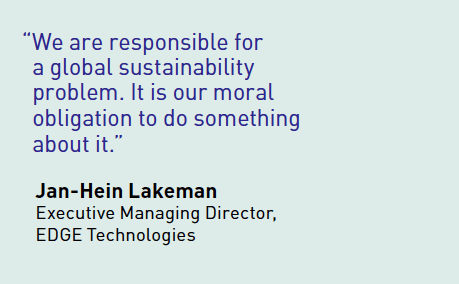
That’s why EDGE Technologies espouses a sustainable, carbon-neutral approach in its buildings. “Buildings should make people healthier,” Lakeman said, pointing to Edge Technologies’ solutions that have added fresh air, natural light, and circadian lighting systems that are said to make people happier and more efficient. “We also focus on creating tech-driven buildings, and that’s really what sets us apart.”
To illustrate this philosophy, Lakeman talked about The Edge, a 43,000-square-foot office building in Amsterdam that won the BREEAM Award for Offices New Construction in 2016. The Edge generates its own power through renewable energy and smart building technologies that also aggregate building systems data to create more energy-efficient environments. Using this same approach, EDGE Technologies has “decreased operational cost by 20% in our buildings in the US and Europe,” Lakeman said. “We also use more efficient mechanical components that take up less space, so we can fit more floors in our building” – which ultimately creates more rentable space.
Buildings designed to be carbon-neutral have higher initial costs, “but the savings on operations you get in the end make for higher NOI and higher valuations,” Lakeman said. “In Europe, where energy costs are higher, the net cost is about the same as a traditional building. But in the US, where energy is cheap, you end up a little higher.”
While smart building systems make for more efficient buildings, emergent building technology nonetheless raises concerns about tenant privacy – or what some experts call the “Big Brother Effect.” Increasingly, developers and operators are facing lawsuits for their data collection processes. One way owners can reduce their risk, Lakeman offered, is to have tenants sign an opt-in waiver. “Surprisingly, 99% of tenants sign immediately and opt for a better experience day-to-day.”
As demonstrated by The Edge, EDGE Technologies and other developers are actively challenging conventional thinking about commercial office construction and management that goes beyond mere BREEAM awards, LEED certifications, or positive GRESB scoring. Would a portfolio of carbon-negative assets be more profitable? Could better data-driven sustainability strategies help solve an even bigger challenge for the world? It’s worth considering.
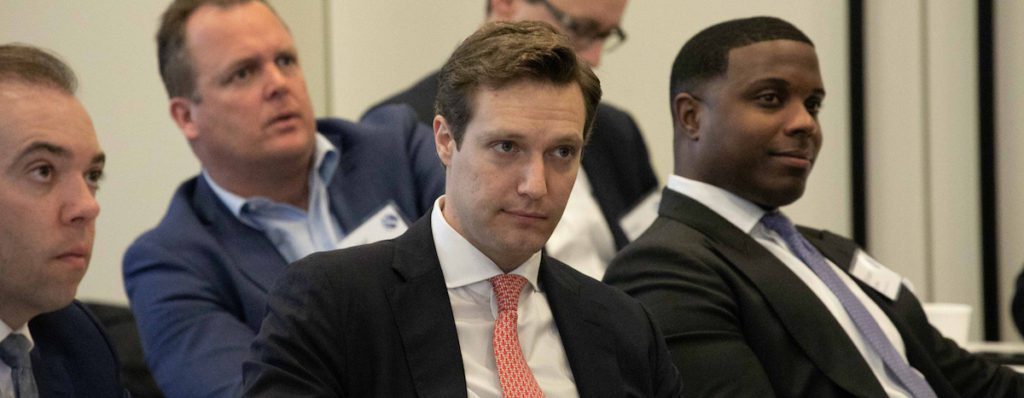
Across big data, industry transformation, and technology transformation as a whole, what are the challenges for the next generation of leadership? Predictions about the future are always imprecise, but it’s important for rising industry leaders to understand what potential opportunities – and pitfalls – lay just beyond the edges of our known horizon.
Data is changing the rules for decision making. Capital is flowing from new sources and asking for new transparency. Tenants are demanding something different from the assets themselves. We are just beginning to understand what kinds of decisions a new generation of leadership will need to make.
Now is not a time to be fearful of what is to come. For AFIRE’s Rising Leaders, now is the time to learn.
QUESTIONS ABOUT RISING LEADERS? CONTACT US.


